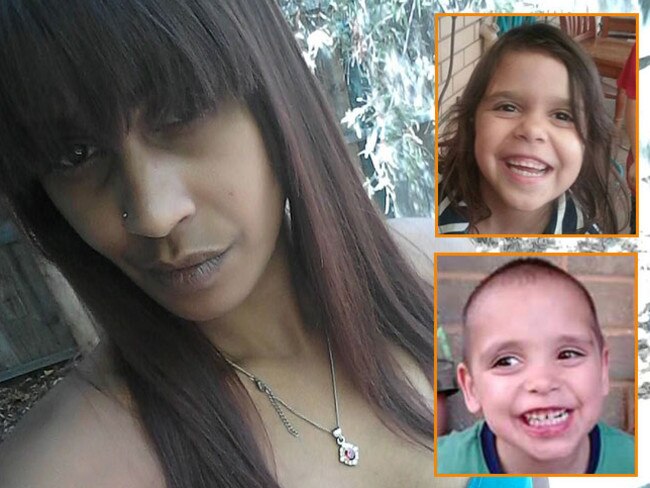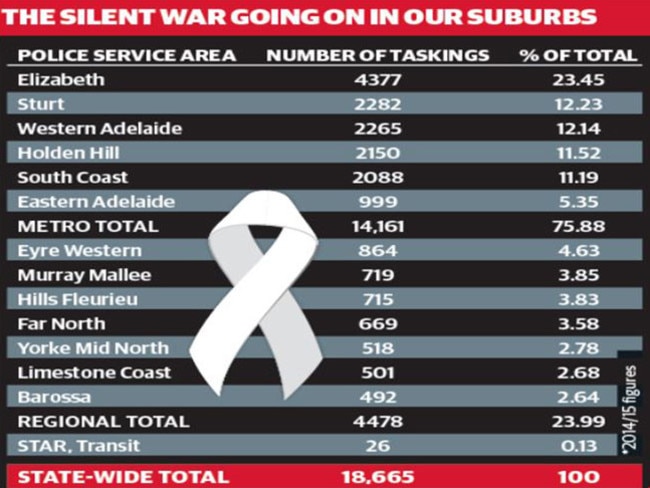Police called to 18,000 domestic violence incidents in a year as Premier Jay Weatherill admits the problem is massive
JUST in one Adelaide local police area alone, domestic violence cases are one in four taskings and campaigners against this social scourge say the issue is not just confined to poorer suburbs.
SA News
Don't miss out on the headlines from SA News. Followed categories will be added to My News.
- Families of domestic violence victims want action to stop deadly toll
- Grieving grandmother says Families SA could have prevented tragedy
- Families SA to finally split from Education Department
POLICE were called to more than 18,000 domestic violence incidents in South Australia in just one year, figures released for the first time reveal.
Almost one in four police taskings in 2014-15 were in the Elizabeth Police Local Service Area, which encompasses several suburbs.
Anti-domestic violence campaigners say socio-economic factors should not be used to excuse the issue and domestic violence was not confined to poorer suburbs.
Premier Jay Weatherill on Saturday echoed those views and acknowledged domestic violence was a “massive issue for our state”. The release of the damning figures comes days after SA’s child- protection system was declared “in crisis”.
Police were called to 18,665 domestic violence incidents in the past financial year, including 4377 – or 23.45 per cent – in the Elizabeth LSA, which includes the suburbs of Davoren Park, Salisbury, Munno Para and Virginia.
Sturt LSA, which stretches from Parkside to Glenelg and down to Hallett Cove, had the next highest number of taskings at 2282, or 12.23 per cent.
SA police have previously said they respond to about 10,000 domestic violence incidents a year. The new figures obtained by the Sunday Mail relate to tasking numbers only, which do not always result in reports of crime and do not relate to numbers of offences for domestic violence.
A tasking is when police are called to an incident, disturbance or report as a result of information received.
The Sunday Mail has previously revealed that more than 6000 aggravated assaults reported each year relate to domestic violence.
Earlier this month it was revealed Families SA was in “active contact” with Adeline Yvette Rigney-Wilson who was allegedly murdered by her partner, Steven Graham Peet, along with her daughter Amber, 6, and son Corey, 5, at their Hillier home.

Seven other men, women and children have also been killed as a result of family violence since the middle of last year.
Central Domestic Violence Service executive director Maria Hagias said every man who used violence against women was accountable for any behaviour used to threaten, harass, seriously injure and kill women.
“We must not excuse this behaviour and justify it due to other factors. Men have a choice and that choice is to not use behaviours that place women and children at risk,” she said.
Ms Hagias said these statistics were unfortunately not surprising, and as efforts continued to raise awareness it was likely the figures would continue to rise.
Arman Abrahimzadeh, whose mother Zahra was killed by her estranged husband in 2010, said there were certainly areas that would have more pressure on them – but he warned domestic violence did not discriminate along socio-economic lines.
“I’m not so surprised, having grown up in the northern suburbs,” Mr Abrahimzadeh, who now runs the Zahra Foundation Australia to support women to leave violent relationships, said.
“While higher levels of criminal activity, unemployment and other social issues like drug and alcohol abuse mean it’s not surprising, they’re not the cause of domestic violence. While they can amplify it, they’re not the underlying factors. It comes down to the person.”
The Premier said these figures represented harm and damage to more than 18,000 women and families across the state, adding: “Domestic violence doesn’t just cause physical harm, it also prevents these women from fully participating in society, compromising their health and wellbeing.
“The statistics also show this is a widespread phenomenon. And whilst likely to be strongly correlated to drug and alcohol abuse and unemployment – that’s not where it ends.

“At its heart there is a fundamental common attitude and that disrespect for women.
“Whatever the cause – there is no excuse.”
An SA police spokeswoman said while it would be “speculative” for police to comment on why reported domestic violence incidents were higher in certain local service areas it could be assumed that “demographic factors” may contribute.
When asked how SA Police used this information to inform its resourcing, the spokeswoman said a wide range of factors were considered and that there had been a range of new policies implemented since these figures were collected.
The spokeswoman listed the Multi Agency Protection Service and the innovative Family and Domestic Violence Branch, both established in 2014, as particular achievements.
“Police have also engaged heavily with the community through educating and encouraging people to report any incidents related to these important crime types and, as a result, we believe that community confidence in police to deal with these issues has increased and this could result in further reporting,” the spokeswoman said.
Opposition police spokesman Dan van Holst Pellekaan said while it was unfair to stereotype suburbs by these figures, it did clearly indicate where police resources were needed and usually after hours.
“High domestic violence areas are where police stations must be open and accessible to women and children after hours because for a range of reasons victims often do not want police coming to their homes,” he said.
“Government budget cuts which force SAPOL to skew employment away from sworn officers and towards civilians will impede the fight against domestic violence as real police officers are required when women and children are in danger in their own homes.”
Status of Women Minister Zoe Bettison said geographical data about the prevalence of domestic violence “would be taken into consideration” when allocating resources but it was important to ensure all regions were covered.
For advice or support phone the Victim Support Service on 8231 5626 or 1800 182 368, D.V. Crisis Service on 1300 782 200 or the D.V. Gateway Service 1800 800 098, 24 hours.


